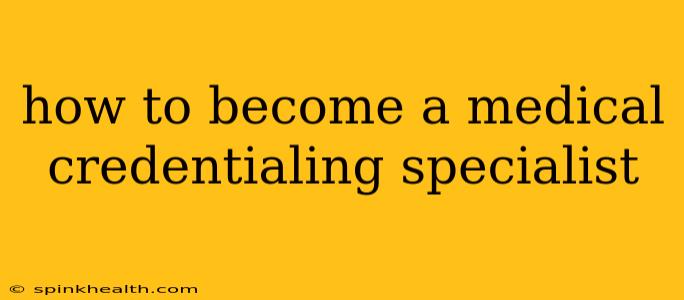How to Become a Medical Credentialing Specialist: A Journey into Healthcare Administration
The world of healthcare is complex, and ensuring that medical professionals are properly licensed and qualified is a crucial aspect of patient safety and smooth hospital operations. That's where medical credentialing specialists come in. This isn't just about ticking boxes; it's about safeguarding patients and upholding the integrity of the healthcare system. This journey requires dedication, attention to detail, and a knack for navigating complex regulations. Let's explore the path to becoming a medical credentialing specialist.
What is Medical Credentialing?
Before we delve into the "how," let's clarify the "what." Medical credentialing is the process of verifying a healthcare provider's qualifications, licenses, certifications, and experience to ensure they meet the standards required to practice medicine within a specific healthcare facility or network. It's a rigorous process involving background checks, education verification, and license validation, all aimed at protecting patients and maintaining the reputation of the healthcare organization.
What Does a Medical Credentialing Specialist Do?
A medical credentialing specialist is the gatekeeper, meticulously managing the entire credentialing process. Their responsibilities are diverse and demanding, including:
- Collecting and verifying primary source documents: This involves gathering information directly from licensing boards, medical schools, and previous employers.
- Completing application forms: They ensure all applications are accurately and completely filled out, adhering to strict deadlines.
- Performing background checks: This crucial step involves running background checks to identify any potential red flags.
- Tracking and managing applications: They meticulously track the progress of each application, ensuring timely completion.
- Communicating with providers and regulatory bodies: They serve as the liaison between healthcare providers and regulatory agencies.
- Maintaining compliance with regulations: They stay abreast of constantly evolving regulations and ensure all practices adhere to them.
How to Become a Medical Credentialing Specialist: A Step-by-Step Guide
The path to becoming a medical credentialing specialist isn't necessarily linear, but it generally involves these key steps:
1. Education and Training:
While there isn't a single mandatory degree, a bachelor's degree in healthcare administration, business administration, or a related field provides a solid foundation. Many specialists also hold associate's degrees, and some enter the field with relevant experience and on-the-job training. Courses in medical terminology, health insurance, and regulatory compliance are incredibly beneficial.
2. Gaining Experience:
Experience is invaluable. Entry-level positions in healthcare administration, medical records, or other related fields can provide a strong foundation. Internships or volunteer work in healthcare settings can also be beneficial.
3. Certification:
While not always mandatory, obtaining a certification demonstrates commitment to the profession and enhances credibility. The American Association of Medical Assistants (AAMA) and similar organizations offer relevant certifications. These certifications typically involve passing an exam after completing educational requirements.
4. Networking and Professional Development:
Networking is key. Attending industry conferences, joining professional organizations (like the National Association of Healthcare Access Management), and connecting with professionals in the field are invaluable for career advancement and staying updated on best practices.
5. Continuing Education:
The healthcare landscape is dynamic, with regulations and procedures constantly evolving. Continuous learning is vital. Medical credentialing specialists must remain informed about changes in laws, regulations, and best practices through continuing education courses and workshops.
Frequently Asked Questions (FAQs):
What skills are needed to become a medical credentialing specialist?
Strong organizational and time-management skills are paramount. Attention to detail is crucial, as is the ability to meticulously track and manage complex information. Excellent communication skills (both written and verbal) are essential for interacting with providers and regulatory bodies. Proficiency in using credentialing software is also vital.
What is the salary of a medical credentialing specialist?
Salaries vary depending on experience, location, and employer. However, you can expect a competitive salary, especially with experience and certifications.
Is this a growing field?
Yes! The demand for skilled medical credentialing specialists is expected to continue growing as the healthcare industry expands. The need for efficient and compliant credentialing processes is only increasing.
What are the career advancement opportunities?
Experienced specialists can progress to supervisory or managerial roles, leading credentialing teams or managing entire departments. Some even transition into roles within healthcare compliance or consulting.
Becoming a medical credentialing specialist is a rewarding journey for those passionate about healthcare and meticulous in their work. It's a profession where attention to detail makes a real difference in the lives of patients and the smooth functioning of the healthcare system. With dedication and the right steps, you can successfully navigate this path and establish a fulfilling career.

